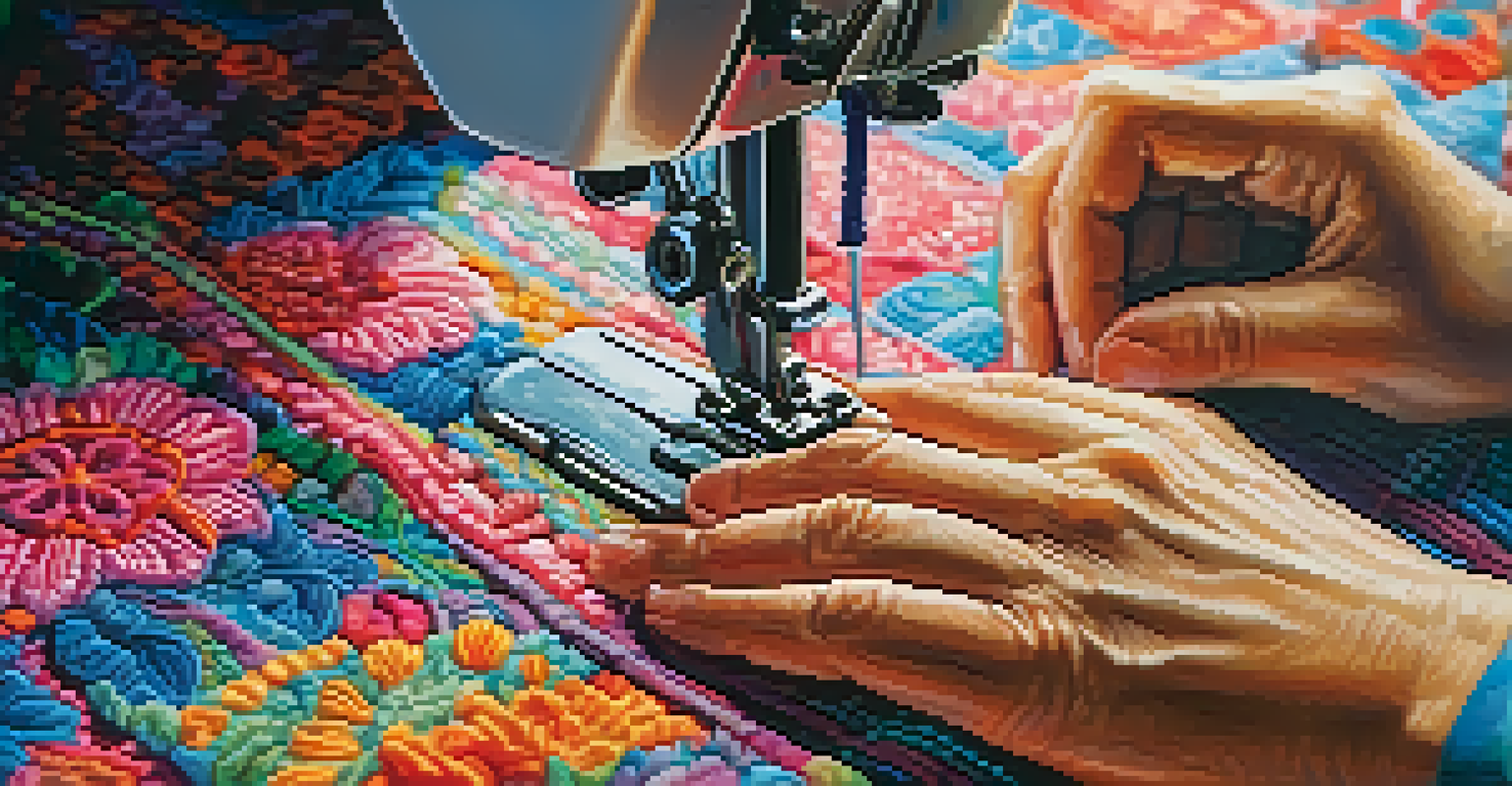The Role of Gig Workers in Sustainable Fashion Production

Understanding Gig Work in the Fashion Industry
Gig work refers to short-term, flexible jobs often facilitated through online platforms. In the fashion industry, this can include freelance designers, seamstresses, and even social media marketers. The rise of gig work is reshaping traditional employment models, making it easier for creatives to contribute to projects without long-term commitments. This flexibility can lead to innovative ideas and diverse contributions in sustainable fashion production.
Sustainability is no longer about doing less harm. It's about doing more good.
Many gig workers bring specialized skills that are crucial for sustainable practices. For instance, a freelance designer might focus on upcycling materials, while a gig seamstress might excel in zero-waste pattern making. By leveraging these niche talents, fashion brands can enhance their sustainability efforts and appeal to eco-conscious consumers. Essentially, gig workers provide a wealth of expertise that can drive the industry toward more responsible practices.
Moreover, gig work allows brands to scale their efforts based on project needs. Unlike traditional models where full-time employees might be required year-round, brands can hire gig workers seasonally or for specific campaigns. This adaptability helps brands minimize waste and optimize resources, aligning perfectly with the principles of sustainable fashion.
Sustainable Practices Driven by Gig Workers
Gig workers play a pivotal role in implementing sustainable practices across the fashion supply chain. They can help brands source eco-friendly materials, create sustainable designs, and even assist with marketing campaigns that promote ethical consumption. By tapping into the expertise of gig workers, brands can adopt practices that resonate with their values and appeal to environmentally conscious consumers.

For example, many gig designers focus on using organic or recycled fabrics, reducing the environmental impact of textile production. Seamstresses can also contribute by creating garments that are designed to last longer, thus addressing the fast fashion crisis. This collaboration fosters an environment where sustainability becomes a shared goal, driving innovation and improvement in the industry as a whole.
Gig Workers Enhance Sustainability
Freelancers in fashion bring specialized skills that boost brands' sustainable practices.
Additionally, gig workers often bring fresh perspectives and new ideas to the table, which is crucial in a field that is constantly evolving. By embracing the diverse backgrounds and experiences of gig workers, fashion brands can experiment with novel sustainable approaches. This not only enhances their product offerings but also engages consumers who are eager to support brands that prioritize the planet.
Challenges Faced by Gig Workers in Sustainable Fashion
While gig work offers flexibility, it also comes with its own set of challenges, especially in the sustainable fashion sector. Many gig workers lack job security and access to benefits, which can deter skilled professionals from pursuing opportunities in this space. This uncertainty can impact the quality and consistency of work, which is critical for brands striving to uphold sustainable standards.
Collaboration is key to innovation and progress in sustainability. We must work together to drive change.
Moreover, the transient nature of gig work can lead to a disconnect between workers and brands. When workers are engaged on a project-by-project basis, it can be difficult to cultivate a shared vision for sustainability. This lack of continuity may hinder the implementation of long-term sustainable practices, resulting in missed opportunities for innovation and improvement.
Finally, navigating the complexities of sustainable fashion can be daunting for gig workers who may not have extensive experience in the field. Without proper guidance or resources, they might struggle to align their work with the sustainability goals of the brands they collaborate with. Therefore, supporting gig workers with education and resources is essential for maximizing their impact in the sustainable fashion landscape.
The Importance of Collaboration in Sustainable Fashion
Collaboration is essential for gig workers and fashion brands to thrive in the realm of sustainability. By working together, they can create a shared understanding of sustainable practices and develop innovative solutions. This collaborative spirit not only enhances the quality of work but also fosters a sense of community among those dedicated to making a positive impact in the fashion industry.
For instance, brands can host workshops or training sessions to equip gig workers with the knowledge and tools needed to implement sustainable practices. These initiatives encourage open dialogue and the exchange of ideas, which can lead to fresh insights and approaches. When brands invest in their gig workforce, they help ensure that sustainability is woven into the fabric of every project.
Collaboration Drives Innovation
Working together, gig workers and brands can develop effective sustainable solutions.
Additionally, partnerships between gig workers and established brands can amplify the reach of sustainable messages. By leveraging each other's networks, they can raise awareness about ethical fashion and inspire consumers to make more informed choices. This synergy not only benefits the individuals involved but also contributes to a broader movement toward sustainability in the fashion industry.
The Role of Technology in Supporting Gig Workers
Technology plays a crucial role in connecting gig workers with fashion brands, facilitating seamless collaboration. Platforms like Upwork and Fiverr have made it easier for brands to find specialized talent for their sustainable projects. This accessibility allows fashion companies to tap into a global pool of gig workers who can contribute unique skills and perspectives.
Moreover, advancements in technology enable gig workers to showcase their portfolios and connect with potential clients more effectively. Social media platforms, for example, provide a space for creatives to share their work and attract clients interested in sustainable fashion. By building a strong online presence, gig workers can establish themselves as credible professionals in the sustainable fashion space.
Additionally, technology can streamline communication and project management between gig workers and brands. Tools like Slack and Trello help teams collaborate more effectively, ensuring that everyone is on the same page. This efficiency can lead to better outcomes and a more cohesive approach to sustainability in fashion production.
Consumer Demand for Sustainable Fashion and Gig Work
As consumer awareness of sustainability grows, so does the demand for ethical fashion options. This shift in consumer behavior is driving brands to seek out gig workers who can help them meet these expectations. By hiring freelancers with expertise in sustainable practices, brands can create products that resonate with eco-conscious consumers and align with their values.
This rising demand for sustainable fashion also presents opportunities for gig workers to establish themselves in a rapidly evolving market. As more brands prioritize sustainability, gig workers with the right skills can find a wealth of opportunities to contribute to meaningful projects. This not only helps them build their portfolios but also fosters a sense of purpose in their work.
Consumer Demand Fuels Opportunities
As consumers seek ethical fashion, gig workers find increasing opportunities to contribute.
Furthermore, consumers are increasingly interested in the stories behind the products they purchase. By highlighting the contributions of gig workers, brands can create narratives that showcase their commitment to sustainability. This transparency appeals to consumers and can foster brand loyalty, making it a win-win situation for both gig workers and fashion companies.
Future Trends for Gig Workers in Sustainable Fashion
Looking ahead, the role of gig workers in sustainable fashion is likely to expand as the industry continues to evolve. With more brands recognizing the importance of sustainability, the demand for skilled gig workers will likely increase. This trend presents an exciting opportunity for creatives interested in making an impact while doing what they love.
As sustainability becomes ingrained in the fashion industry, we may also see a shift toward long-term partnerships between gig workers and brands. This could lead to more secure opportunities for workers while ensuring that brands maintain a consistent approach to sustainability. Such collaborations can foster innovation and drive progress within the industry.

Finally, as technology continues to advance, gig workers will have even more tools at their disposal to enhance their contributions to sustainable fashion. From AI-driven design tools to advanced sourcing platforms, the future is bright for those embracing gig work in this field. Ultimately, the synergy between gig workers and sustainable practices promises to drive meaningful change in the fashion industry.